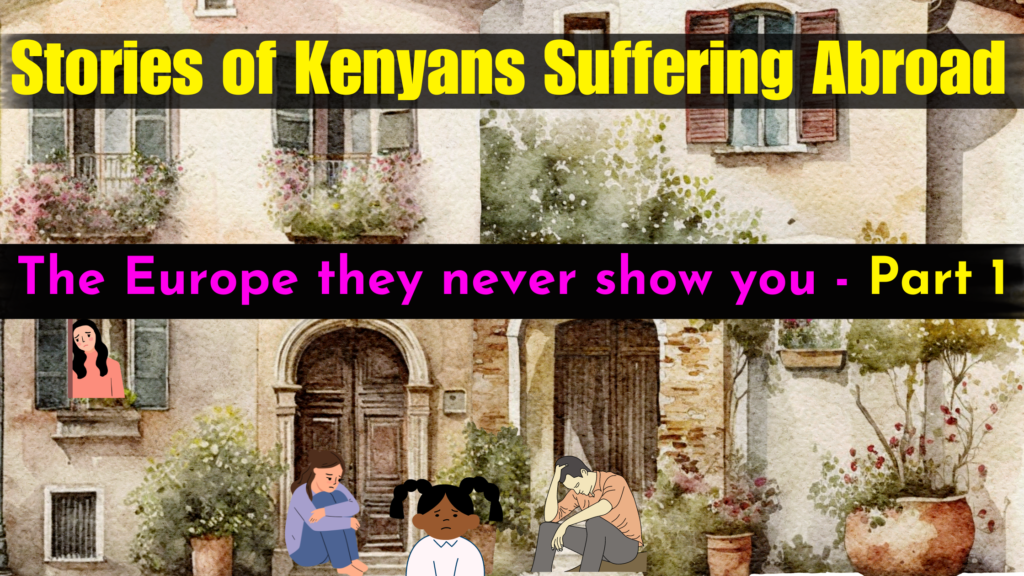While the allure of living abroad often conjures images of new adventures, better opportunities, and an improved quality of life, the reality for some Kenyans is far from glamorous which leads to Kenyans suffering abroad. Life abroad can be challenging, filled with unexpected difficulties that cast a shadow on the initial excitement. In this article, we delve into the darker side of living abroad through the stories of Kenyans suffering abroad who have faced hardship, regret, and a longing for the homeland they left behind.
The Dark Side of Living Overseas – Kenyans Suffering Abroad
Contrary to the common narrative, life abroad is not always rosy. Behind the picturesque landscapes and promising job opportunities lies a dark side that is seldom discussed. Let’s explore the stories of Susan and Ben, who are Kenyans suffering abroad. Their stories shed light on the challenges they faced when they sought a better life beyond their home country.
Note: The names used in the stories above have been changed to protect the identity of the individuals interviewed.
1. Susan’s Story: A Health Worker Abroad
Kenyan nurse living abroad regrets
Susan*, a passionate and dedicated health worker from Kenya to Britain, embarked on a journey abroad, fueled by dreams of a better life and expanded horizons. Little did she know that her pursuit of professional growth would lead her into the depths of a challenging and toxic work environment, shattering the illusions of a brighter future.
Arriving at her new destination, Susan was greeted by the gleaming façade of the hospital where she was set to work. The promise of a better salary and the opportunity to make a difference in the lives of others were the driving forces behind her decision to leave Kenya. However, the reality within the hospital’s walls was far from what she had envisioned.

Bullied and overworked, Susan found herself caught in a relentless cycle of shifts that left her with minimal time for rest and recuperation. The demand for her skills came at the expense of her well-being, as she faced constant pressure to meet unrealistic expectations. The lack of overtime pay further exacerbated her struggles, as each day blurred into the next, a relentless marathon of exhaustion.
Sleep became a luxury for Susan, with only a few hours wedged between the end of one shift and the beginning of the next. The hospital’s relentless pace, coupled with an unsupportive work environment, took a toll on her physical and mental health. The dreams of professional growth and personal fulfillment seemed to slip away as she navigated the treacherous waters of a healthcare system that demanded more than it gave.
In addition to the grueling workload, Susan found herself facing a different kind of challenge – cultural and social isolation. Far from the familiar faces and comforting embrace of her Kenyan community, she felt like a solitary figure in a foreign land. The absence of the communal bonds she cherished back home only added to the weight of her struggles.
The lack of support within the hospital intensified Susan’s feelings of isolation. The bullying she endured from colleagues and superiors eroded her confidence and shattered her sense of professional pride. The dream of making a meaningful impact in the lives of patients became a distant memory, replaced by the daily battle for survival in an unforgiving work environment.
Susan’s regret for leaving Kenya for Britain deepened with each passing day. Despite the modest pay back home, there was a dignity in her work, a sense of purpose that transcended the monetary compensation. The camaraderie among colleagues and the shared understanding of the challenges they faced created a support system that now felt like a distant mirage.
As the months unfolded, Susan grappled with the decision to continue enduring the hardships abroad or to return to the familiarity of her homeland. The emotional toll of her journey weighed heavily on her, prompting moments of reflection on whether the pursuit of professional growth was worth sacrificing her well-being and sense of self.
In Susan’s story, we witness the unraveling of the dreams that led her across borders. The struggle for balance between professional aspirations and personal fulfillment becomes a central theme, highlighting the harsh realities that health workers like Susan face when the pursuit of a better life abroad comes at the expense of their physical and emotional well-being.
2. Ben’s Dilemma: A Teacher’s Struggle in Inner City America
Africans suffering abroad
Ben*, a passionate educator from Kenya, embraced the allure of teaching abroad through a popular teacher exchange program, envisioning an experience that would not only broaden his professional horizons but also expose him to diverse cultures. Little did he know that his journey would lead him into the challenging terrain of inner-city schools in America, where the complexities of classroom management and cultural clashes would redefine his understanding of education.
Assigned to teach in inner-city schools, Ben found himself in a starkly different environment than the one he had known in Kenya. The students were a formidable force, their backgrounds shaped by socio-economic challenges that permeated their everyday lives. In contrast to the attentive and respectful students he had taught in Kenya, Ben encountered unruly classrooms where maintaining control became a daily battle.
The pressure to control his class was further intensified by the presence of weapons—guns and knives—secretly carried by some students. Unlike the secure teaching environment he had experienced in Kenya, Ben now had to grapple with the constant fear for his safety, a concern that transcended the academic realm and encroached upon the very essence of his well-being.
Ben’s accent became a focal point for mockery and disdain among the students. Accustomed to the respectful attitudes towards educators in his home country, the American students challenged his authority, questioning his background and demeaning him with questions about Africa. The cultural clash, combined with the inherent challenges of inner-city education, left Ben feeling like a fish out of water.

The school administration’s demand for control in the classroom added an extra layer of complexity to Ben’s predicament. Unlike in Kenya, where teachers held a position of authority, he found himself navigating a landscape where students could sue teachers if disciplined. The fear of legal repercussions loomed large, forcing Ben into a dilemma—how to assert his authority without risking legal consequences.
The inner-city schools were a far cry from the educational institutions Ben had imagined when he embarked on his journey, his story being one of hundreds of Kenyans suffering abroad. The lack of resources, coupled with the constant battle against student misconduct, left him questioning the efficacy of the exchange program. The promise of a cross-cultural teaching experience had transformed into a daily struggle to maintain order in an environment that seemed designed to thwart educational progress.
As Ben grappled with these challenges, he found himself at a crossroads. The passion for teaching that had driven him to explore opportunities abroad now faced the harsh reality of inner-city education in America. The dilemma of using disciplinary measures familiar to him from Kenya while navigating the intricate legal landscape of American education became a mental and emotional burden.
In Ben’s story, we witness the clash of educational systems and the challenges faced by teachers in inner-city America. The idealistic pursuit of a cross-cultural teaching experience collided with the complexities of classroom management, cultural differences, and the broader societal issues that permeate the American education system. Ben’s journey became not just a quest for professional growth but a poignant exploration of Kenyans suffering abroad, and the sacrifices and dilemmas that accompany teaching in unfamiliar territories.
Conclusion
These stories offer a glimpse into the hidden struggles faced by Kenyans suffering abroad. While the prospect of a better life is a powerful motivator, it is essential to acknowledge the challenges and uncertainties that accompany such journeys. Each story underscores the importance of careful consideration before making the life-altering decision to relocate, reminding us that the grass is not always greener on the other side.


Pingback: Kenyans Struggling Abroad - Stories of Africans Suffering in Europe